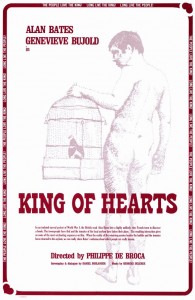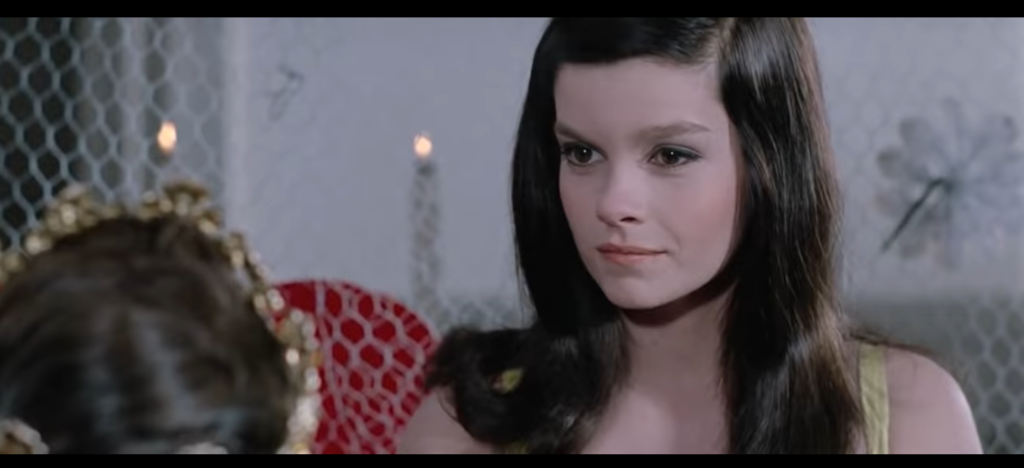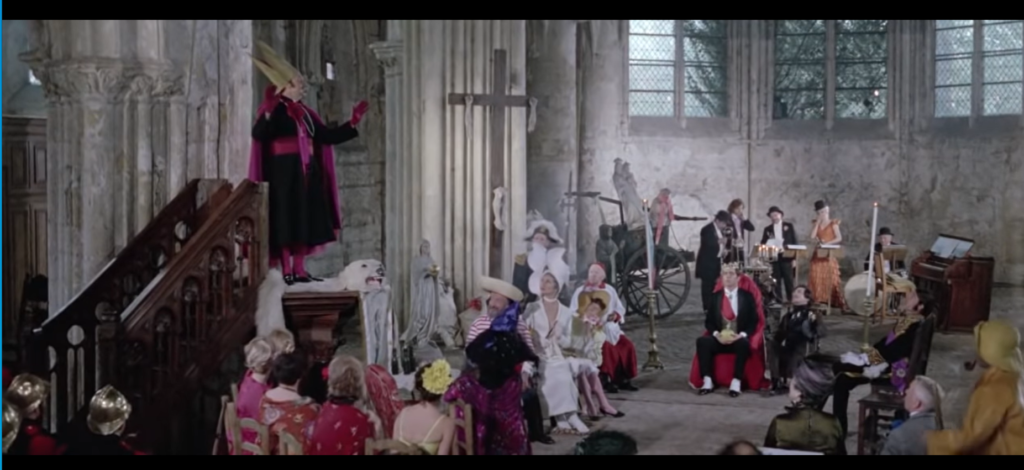“All life is a spectacle — you’re on a stage.”
|

Synopsis:
During the final days of World War I, a meek private named Charles Plumpick (Alan Bates) is sent to a French village to find and dismantle a bomb. Once there, he discovers that most of the citizens have fled, and that harmless insane asylum inmates are roaming the town. They crown Plumpick their “King of Hearts”, and he falls in love with the sweet inmate “Coquelicot” (Genevieve Bujold).
|
|
Genres, Themes, Actors, and Directors:
- Alan Bates Films
- French Films
- Genevieve Bujold Films
- Mental Illness
- Race Against Time
- Romance
- World War I
Response to Peary’s Review:
I agree with Peary that this “phenomenally popular” cult film of the “late sixties and early seventies” now comes across as “terribly dated” and thematically “trite”. As Peary notes, countless other films have shown us that “those people on the outside of jails and asylums are the ones who should be institutionalized, [and] that war is bad” — these aren’t particularly unique insights. King of Hearts is primarily worth watching today for its status as a 1960s anti-war film which appealed to those “seduced by all films that defended nonconformity and opposed war.”
Redeeming Qualities and Moments:
- Genevieve Bujold as “Coquelicot”

- Pierre Lhomme’s colorful cinematography

Must See?
No, though it’s worth a look for its status as an erstwhile cult favorite. Discussed at length in Peary’s Cult Movies (1981).
Links:
|
One thought on “King of Hearts (1966)”
A once-must, as a delightful cult item.
Obviously I’m taking a contrary view here. Although it is true that there have been other films depicting ‘the insane being more sane than the sane’, ‘King of Hearts’ is a memorable feel-good film on the futility of war and the power of unconditional love. I’m doubtful that the intent behind it is anything other than that of a fable – and, as such, I believe it succeeds. Director Philippe de Broca serves up the tale with whimsical gentleness and, in turn, is served well by his cast. The film is also shot impeccably, largely in very rich tones, by DP Pierre Lhomme and afforded an appropriately amiable score by Georges Delerue. The film, to me, doesn’t feel dated in the slightest – and actually has a feeling of timelessness to it.
One does need a certain suspension of disbelief: there is no real breakdown of individual behavior among the inmates of the asylum; they seem to act as one, more or less sharing the characteristics of openness, acceptance and child-like wonder. Those attributes act collectively as the catalyst which will gradually draw Bates into his (and mankind’s?) preferred state of mind.
Overall, this is a breezy experience as a film. Bates, making a striking appearance, is wonderfully light and vulnerable. Bujold does not have a whole lot to do, but she is charming nevertheless. It’s nice seeing Adolfo Celi – who apparently was often cast for his looks and his general aura* – being relatively playful just after his more imposing role in ‘Thunderball’. The French actors who make up the supporting cast of characters each shine in various individual moments.
As a comedy, ‘KoH’ is not of the laugh-out-loud variety. However, I find that it’s a film that leaves me with a consistent smile throughout a viewing. This is a good thing. 😉
*[Celi’s] voice was dubbed by another actor in most of his movies throughout his career, even in his native Italy, to hide his distinctive Sicillian accent. Despite speaking fluent English, Spanish, French, Portugues[e], and German in addition to his native Italian, his voice was often dubbed by another actor in both Italian language and foreign language movie productions.(IMDb)